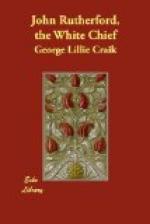After his return to England Rutherford occasionally maintained himself by accompanying a travelling caravan of wonders, showing his tattooing, and telling something of his extraordinary adventures.
The publisher of this volume had many conversations with him in January, 1829, when he was exhibited in London. He was evidently a person of considerable quickness, and great powers of observation. He went over every part of his journal, which was read to him, with considerable care, explaining any difficulties, and communicating several points of information, of which we have availed ourselves in the course of this narrative.
His manners were mild and courteous; he was fond of children, to whom he appeared happy to explain the causes of his singular appearance and he was evidently a man of very sober habits. He was pleased with the idea of his adventures being published; and was delighted to have his portrait painted, though he suffered much inconvenience in sitting to the artist, with the upper part of his body uncovered, in a severe frost.
Upon the whole he seemed to have acquired a great deal of the frankness and easy confidence of the people with whom he had been living, and was somewhat out of his element amidst the constrained intercourse and unvarying occupations of England. He greatly disliked being shown for money, which he submitted to principally that he might acquire a sum, in addition to what he received for his manuscript, to return to Otaheite.
We have not heard of him since that time; and the probability is that he has accomplished his wishes. He said that he should have no hesitation in going to New Zealand; that his old companions would readily believe that he had been carried away by force; that from his knowledge of their customs, he could be most advantageously employed in trading with them; and that, above all, if he were to take back a blacksmith with him, and plenty of iron, he might acquire many of the most valuable productions of the country, particularly tortoiseshell,[CQ] which he considered the best object for an English commercial adventure.[CR]
Rutherford is not the only native of a civilized country whose fate it has been to become resident for some time among the savages of New Zealand. Besides his shipmates, who were taken prisoners along with him, he himself, indeed, as we have seen, mentions two other individuals whom he met with while in the country, one of whom had been eight years there, and did not seem to have any wish to leave it.
[Illustration: A Maori war canoe.]




